11 Best WooCommerce Plugins for Your eCommerce Store
My list of the 11 best WooCommerce Plugins! Do you…
Technically, WordPress is an open source content management system. But simply explained, WP is the most popular and easiest way to create your own blog or website. Since you don’t need to have any programming knowledge to use WordPress, it’s accessible to everyone.
Both WordPress and poetry can be used to express oneself creatively and share one’s thoughts and feelings with the world.
WordPress is a CMS for everyone. With WordPress-Plugins and WordPress themes, you get the most out of your blog. WordPress is modular. With a theme you control the look and feel and with Plugins or extensions you add every feature you can think of.
WordPress is the most used CMS (Content Management System) worldwide. Based on the technologies PHP, MySQL, JavaScript and HTML, WP is built on the typical LAMP stack (Linux, Apache, MySQL and PHP). The GPLv2 license allows not only the free use, but also the modification of the system.
The strength of WordPress is the ease of use and the almost unlimited expansion through Plugins. Exactly these two circumstances have made the system grow extremely fast from the beginning. With so-called themes, the appearance of the blog can be completely changed with just one click. Moreover, there are thousands of free themes and just as many paid premium themes. Therefore, WP is suitable for almost all types of websites, such as:
We will show you how to optimize and improve your own blog. Design, speed and readability need to be adjusted for visitors and search engines.
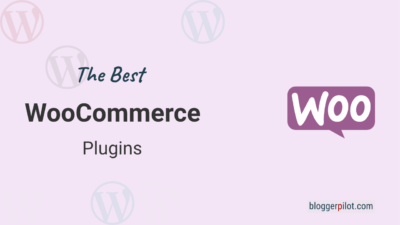
My list of the 11 best WooCommerce Plugins! Do you…
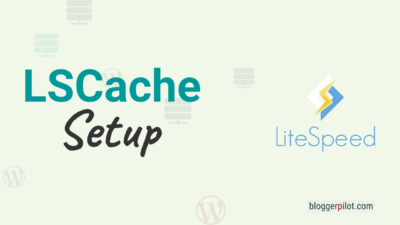
LiteSpeed Cache has a wealth of cutting-edge functions. If all…

My perfect WordPress .htaccess to make your website load faster…

With this code snippet, you activate the Gutenberg Block Editor…

This code snippet adds a new column to the WordPress…
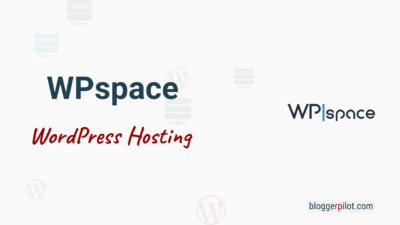
I was looking forward to the review and speed test…
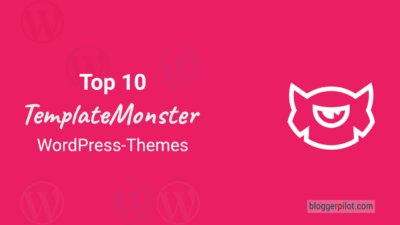
Today I want to show you 10 WordPress 6 themes,…

Code Snippets I used for a long time, now there…

My choice of the best WooCommerce themes. WooCommerce is the…
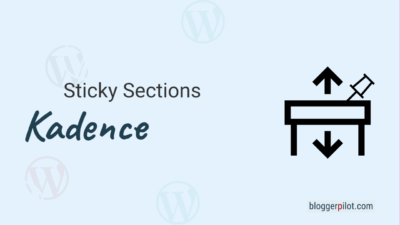
Wow, I wasn’t expecting Sticky Sections. The Kadence team has…
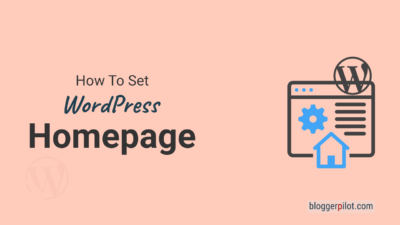
WordPress offers several ways how you can display content on…
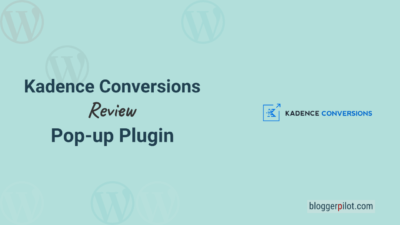
The WordPress plugin Kadence Conversions makes it easy to design…
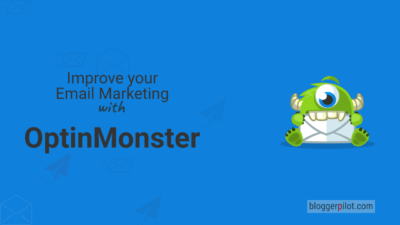
With OptinMonster, you have all the tools for email marketing…
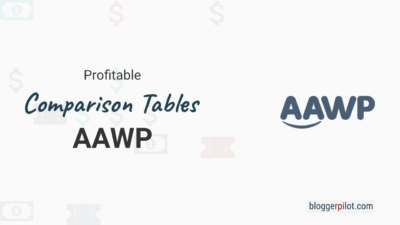
Many Amazon affiliates are already familiar with the AAWP plugin….

I want to show you 5 tasks that you can…

With the combination of Cloudways with Cloudflare Enterprise Addon you…
WordPress is a software that can be used for free to produce a website or blog as easy as possible. About 40 percent of homepages present on the Internet today have already been created with this content management system (CMS for short). It allows managing content and other factors of the site in a simple way and that without being able to program yourself.
WordPress is not only limited to private websites, but is also used in the business sector, for example for online stores or for corporate presentations. For maximum flexibility, WordPress is installed on your web hoster, but there is also a paid alternative, where the homepage is hosted externally.
The popularity of this CMS is also explained by the fact that you can change the appearance of your own website through various themes and plugins. These enable additional functions, for example, the operation of an online store or the creation of a form. Since there are already over 50,000 free plugins and 5,000 themes, plus several paid, there is something for every website owner with their individual needs.
WordPress is a content management system based on PHP and MySQL. The code is developed by the WordPress Foundation and countless free helpers under the GNU GPLv2+ license. The first version was available for download on 27.05.2003.
Matthew Mullenweg had started the programming with Mike Little. Mullenweg is still at the head of the company Automattic, which among other things also operates the free blog service wordpress.com.
For every WordPress website a login address is automatically created. This is the way to get into your WordPress admin.
Now you have to combine the URL of your domain with this addition:
wp-login.php
This means that the link will then look like this:
https://yourdomain.wordpress.com/wp-login.php
https://yourdomain.com/wp-login.php
If you use this link, you will have access to your website anytime and from anywhere.
Alternatively, it is enough to append this to your web address /wp-admin. If it is too much for you to call your website every time via this link, then just save the link as a bookmark.
A first option to log in is the meta widget. This is installed by default on most themes and allows login in the frontend. However, this widget comes with some disadvantages. These are:
The second option is a plugin. It is a sidebar login and allows you to log into the frontend. It is also available for free in the WordPress repository. The login function is hereby placed in the sidebar. However, no changes are possible here either. If you want to customize the login function to your site, are Theme My Login or Custom Login are the right themes.
However, for customizing the dashboard in the backend, it is suitable to use this plugin: Erident Custom Login and Dashboard.
Especially the login area is a popular point of attack for hackers. This is not only true for your WordPress login. Therefore, you should consider a few things to adjust the security accordingly.
Also, make sure to make regular backups. This will give you more security if you have made changes to your website and can reduce damage if the website does get hacked.
Even though they are based on the same software, they are fundamentally different. We will now take a closer look at the differences.
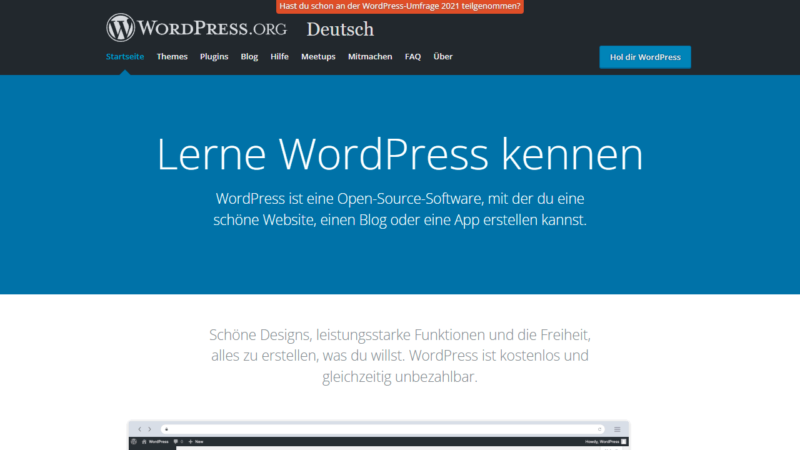
WordPress to install yourself: wordpress.org
wordpress.org is the PHP script you need to download and install on your webspace.
Advantages:
You can completely customize WordPress on your own webspace according to your needs. With fewer restrictions, you have full control over your website. You also get full access to all plugins and themes. You can also freely choose your username here.
Disadvantages:
There are monthly costs for the webspace. In addition, the training costs more time. The installation alone is more time-consuming. You are responsible for security and maintenance. This increases the risk of becoming a target for hacker attacks.
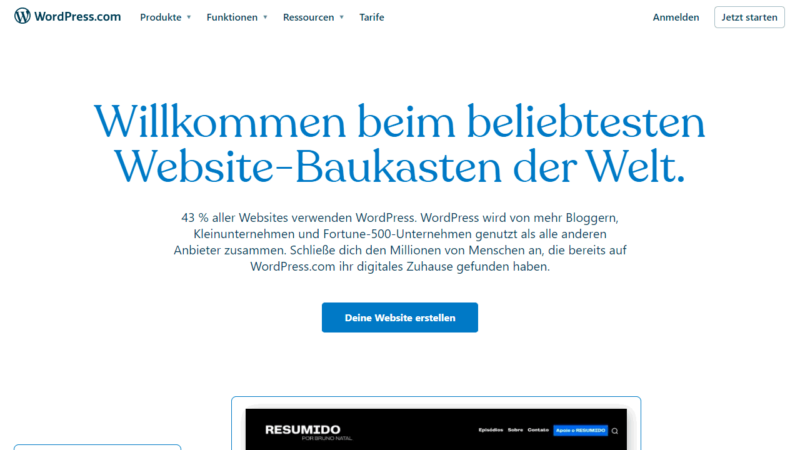
The WordPress blog service: wordpress.com
wordpress.com is a blog service where you can register for free with your email address.
Advantages:
The service can be used completely free of charge. And the learning phase is very short. In addition, the updates run automatically and regularly. By hosting with Automattic, security and maintenance are already covered, so you don’t have to worry about that
Disadvantages:
No plugins can be installed. In addition, the free version includes many restrictions, such as only 3 GB of storage space. On top of that, wordpress.com is allowed to place ads on your site.
WP websites consist of two parts. The content and customizations. Content consists of media, posts and pages, which you can edit or add under this point:
The customizations you make via the Customizer. Here you can edit menus, add widgets and many other settings. You can get to the Customizer like this:
Design > Customizer
Start by adding some pages. To achieve this, go to: Pages > Create. The block editor will open. Depending on the theme, you have the options of choosing a predefined layout or starting with a blank page. Further steps are as follows:
To explain all the next steps point by point, we have created a detailed guide on how to create your own blog.
If you work with the guide, you should get to your first blog in no time. But if you get stuck, you can always find help in the WordPress forums.
This is a brief overview of how to create a website with WordPress. If you follow the steps above, you can create your website in no time. WordPress offers a simple but powerful way to start your web presence without the need for prior experience or a lot of money.
With WordPress themes you get structure in your site. Because of this you have the possibility to make your website unique. In short, a theme is a sample website, which you can connect to the CMS. However, it does not only determine the look of your website. It is also responsible for what your website can do.
I would recommend Kadence, Divi or Astra. If you are looking for a complete WordPress environment, Thrive Themes is a great alternative.
When you reinstall WordPress, the default theme is automatically included. However, you can also change it. Think carefully about which features are important to you, and take your time to look for the right theme. For this, there are live demos that you can watch before installing.
It is important to know that you think about a theme change carefully. If you delete the old theme, all changes and customizations will be lost. This means that you should always make a backup beforehand. Before you go online with your new theme, try it out in a test environment first.
A WordPress plugin is a PHP script. This extends after activation the WordPress installation by certain functions. For example, you can use a plugin to link your social media profiles with your website. The advantages of plugins are the following:
I have some default plugins that I install on every blog. These include Yoast SEO, WP Rocket, Kadence Blocks, and Link Whisper.
Performance has an impact on any areas. If the performance is bad, you have to expect a low conversion rate. In other words, online stores lose a lot of revenue when load times become higher. So that the loading times are constantly reduced, you should access different plugins
It is up to you to decide whether an all-in-one solution is the right one or whether you prefer to install different plugins for individual tasks. We also have these tips to ensure good performance:
Tools that show you exactly where to change something are helpful here. But it is important to know how to use these tools and what to look for. The best tools for onpage optimization are Ryte and Semrush.
Once you have decided on the wordpress.org version, you need to think about where you want to install your site. For this, compare different hosters and choose according to the criteria that are important to you. Ask yourself the following questions:
Hosting recommendations are usually garbage.
Often extremely cheap hosting packages for $ 3 are recommended, others advertise a $ 100 VPS, because they earn the most as an affiliate thereby. In the end, we all just want the fastest possible web space for as little money as possible.
And optimized for WordPress!
What else is important? The server should be a fast backbone for your website and the support should answer as fast as possible, and preferably in your language.
You can get all this at Cloudways from $ 10,00 / month.
It is important to choose the location of your webspace or server based on the majority of your visitors. If you write in German, your provider should also be in Germany. For international English-language websites, America is a good choice. You should also consider whether the LiteSpeed server is a better option for you.
With webspace you share a server with many other customers of the provider. Each customer gets a place (space) on this server. The resources (processor and memory) are equally available to all. This is also the biggest disadvantage. If a user uses too many resources on the server, your website may respond very slowly or not at all.
With a web server or virtual server (VPS) you rent your own server, where you don’t have to share the resources with anyone.
So the big advantage is that you have 100 percent of the resources at your disposal.
The disadvantage is the high monthly costs.
Search engine optimization (SEO) is a crucial factor to ensure the success of your website. WordPress is one of the most popular content management systems (CMS) and offers numerous ways to optimize your website for search engines. In these 300 words, you’ll learn how to optimize your WordPress website for better visibility in search results.
A good foundation is crucial. Choose an SEO-friendly theme that is designed for speed and usability. Make sure the theme is responsive to ensure optimal viewing on different devices.
An SEO plugin like Yoast SEO or All in One SEO Pack will help you optimize your content for search engines. These plugins offer features like meta tags, XML sitemaps and Google Analytics integration.
A clean and simple permalink structure allows search engines to index your content more easily. Go to “Settings” > “Permalinks” and select the “Post name” option to get a simpler and more readable URL structure.
Titles and meta descriptions are important signals for search engines. Make sure your titles are meaningful and keyword rich without being unnatural. The meta description should briefly summarize the content of your page and give users a reason to click on your website.
Images can affect the loading time of your website and therefore the search engine ranking. Use a plugin like Smush or EWWW Image Optimizer to reduce the file size of your images. Don’t forget to use descriptive file names and alt tags for your images.
Content is the heart of your website. Make sure to create high-quality, unique and relevant content that adds value to your users. Use keywords, but don’t overdo it to avoid keyword stuffing.
Link to related posts and pages within your content to build a good internal linking structure. At the same time, get your site linked to high-quality, topic-relevant pages to increase your authority according to search engines.
Load times have a direct impact on user experience and search engine rankings. Use tools like GTmetrix or Google PageSpeed Insights to check your website speed and get optimization suggestions.
By following these steps, you’ll ensure that your WordPress website is optimized for search engines and thus achieve higher visibility in search results.

Firstly, WordPress offers a variety of e-commerce plugins that allow you to set up an online store easily and effectively. WooCommerce is the most popular and widely used plugin for e-commerce on WordPress. It offers a wide range of features such as product management, payment processing, shipping options and much more.
Likewise, WordPress allows easy integration of various payment and shipping options. You can integrate various payment gateways like PayPal, Stripe, credit cards or bank transfers into your online store. At the same time, you can offer different shipping options like local pickup, shipping by mail or courier service.
Another advantage of WordPress for e-commerce is the ability to fully customize the design of your online store. There are a variety of WordPress themes designed specifically for e-commerce.
Overall, WordPress offers a user-friendly and cost-effective solution for e-commerce. It allows you to effectively run your own online store while maintaining full control over the design and content. With the right plugins and customizations, you can make the most of your online store and be successful.
WordPress website security is an important aspect that should not be neglected. Hackers and malware are omnipresent on the Internet, so it is essential to take appropriate measures to protect your website.
Foremost, it is important to always keep WordPress and all plugins as well as themes up to date. Developers regularly release updates that close security holes and reduce potential gateways for hackers. Therefore, you should make sure that you always use the latest version of WordPress.
Another critical step is to use strong passwords. Weak passwords are easy to crack and allow hackers to gain access to the website. It is advisable to use long and complex passwords that consist of a combination of upper and lower case letters, numbers and special characters.
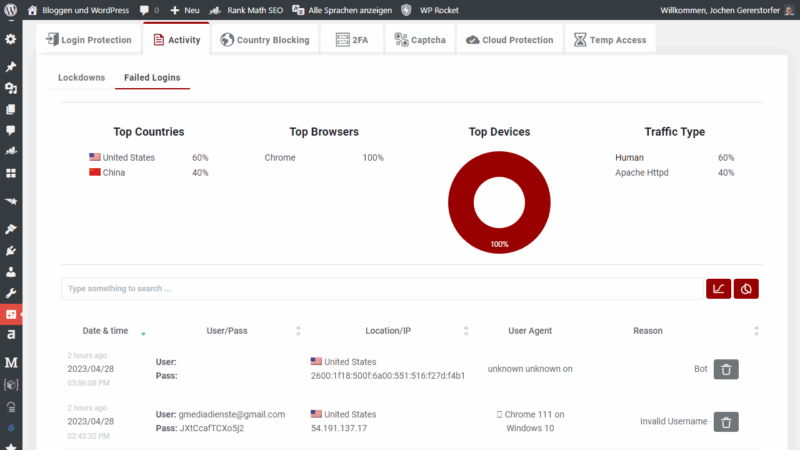
Furthermore, it makes sense to install a firewall for the website. A firewall monitors traffic on the website and blocks suspicious activity. There are several WordPress plugins that offer firewall features and help protect the website from potential attacks.
Creating regular backups is also a significant security measure. In the event of a successful hack or malware infection, backups allow the site to be restored to a previous, safe state.
In addition to these measures, you should use trusted themes and plugins, as insecure or buggy codes can be potential vulnerabilities.
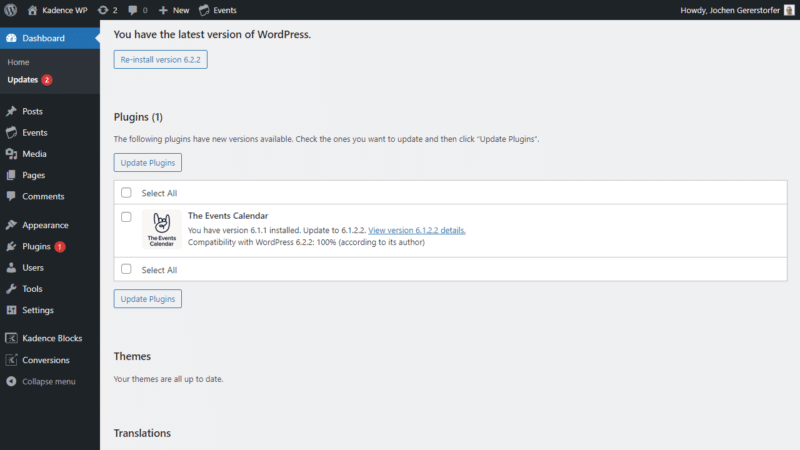
WordPress updates are crucial to keeping your website secure and functional. Periodically, WordPress releases new versions that fix bugs, close security holes, and introduce new features. Here are some tips on how to keep your website up to date.
The first step is to check for updates regularly. Log into the admin dashboard of your WordPress website and check the “Updates” section. Here you will see if new versions of WordPress, themes or plugins are available. It’s important that you install these updates promptly to minimize security risks.
If you need support for WordPress, there are several ways to get help. One popular option is the official WordPress support forum. There you can post your questions and get answers and solutions from the WordPress community. There are also numerous WordPress online communities where you can interact with other WordPress users and ask for advice.
Likewise, many companies and freelancers offer professional WordPress support. These experts specialize on WordPress and can help with complex queries or problems. You can find them either through search engines or platforms for freelancers.
Of course, you can also get professional WordPress support from me.
WordPress is free of charge. Both the hosted version on wordpress.com, as well as the version for self-installation on wordpress.org.
Yes, WordPress is a CMS.
Although WP was designed at the beginning as a pure blogging system, over the years it has developed into a real CMS with all the necessary functions. Especially through the thousands of plugins WordPress can be adapted to all needs.
wordpress.org is a script that you have to install on your own webspace or server.
wordpress.com is a service where you can start your blog for free.
With 20 years of experience in online marketing, I have managed and implemented numerous projects using WordPress as a CMS. I have known the system for years and have always been able to follow and respond to its development and functioning.
Thanks to this long-standing expertise, I am able to neutrally evaluate the pros and cons of WordPress and provide you with the necessary knowledge to successfully plan, implement and optimize your projects. My experience and know-how with my passion for online marketing allow me to give you valuable insights into the use of WordPress and answer your questions.
Now you know the basics about WordPress and what things you need to pay special attention to. The fact is that WP is quick to install and easy to use. Moreover, you can use it very well in a free version. The individual design options add up to a good overall package.
Because with WordPress, you’re using one of the most popular ways to create websites. No matter if you run a blog or an e-commerce store. However, note the differences between wordpress.org and wordpress.com and which of the two is sufficient or better for you.